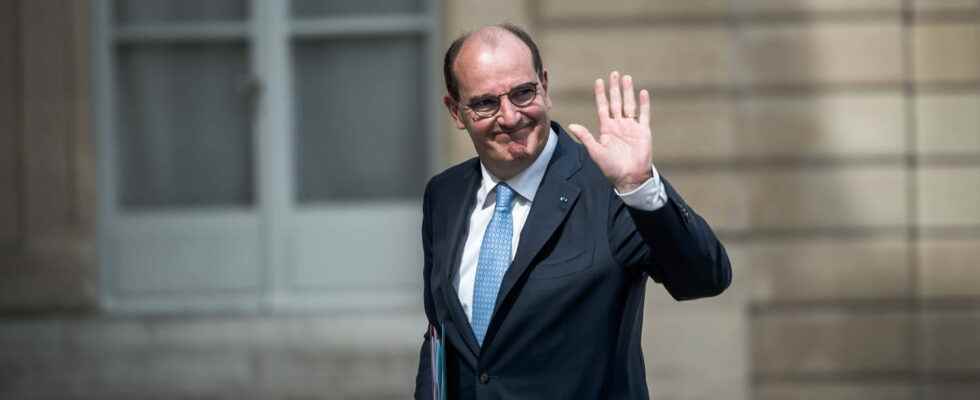CASTEX. Jean Castex has not yet presented his resignation and that of his government. Even if he is committed to it, the Prime Minister still remains in office. Emmanuel Macron would like to keep it until the legislative elections.
Will Jean Castex make much more money than expected? While the Prime Minister had assured that he would present his resignation, as well as that of his government, to Emmanuel Macron “in the days following” the re-election of the President of the Republic, the Matignon tenant has still not done so. . While the head of state won the presidential election more than a week ago, the former Mr. Déconfinement continues his missions as head of government. While two post-election councils of ministers have already taken place, no upheaval seems to be foreseen in the immediate future, even though Emmanuel Macron will be officially invested on Saturday May 7, 2022. “The Castex government will go to the end of the five-year term of Emmanuel Macron,” said Gabriel Attal, government spokesperson, on Wednesday May 4. An official version which seems to hide a more complex situation than expected for the Head of State. Indeed, he still would not have found his rare pearl to replace the former mayor of Prades (Pyrénées-Orientales). So much so that, while he suffered two refusals, Emmanuel Macron would have thought of keeping Jean Castex in office until the legislative elections. Pending finding a profile similar to the fifty-year-old, the head of state made the proposal to the resident of Matignon. Despite the end of inadmissibility opposed by the Catalan of origin, Emmanuel Macron would have liked to see his Prime Minister go until June 19. But he should resign himself to seeing him leave Matignon well before the ballot.
It is an almost unprecedented scenario that presents itself here, a symbol of the upheaval in politics caused by Emmanuel Macron since 2017. For the first time since the re-election of General de Gaulle in 1965, an outgoing president has been re-elected with a governmental and parliamentary majority. Otherwise, either the elected Head of State was from a different political side than the previous one, or his re-election had been obtained following a period of cohabitation. Jean Castex therefore finds himself there in a particular situation.
If he announced that he would submit his resignation as well as that of his government, no text of law obliges him to do so. Nothing can force him to leave Matignon. Especially since the President of the Republic does not explicitly have the right to dismiss his Prime Minister. A departure is made at the request of the Head of State or by resignation. Jean Castex, he invokes a “republican tradition” to “give new impetus”, as he had specified in the Figaro At the beginning of April. It is rather a “courtesy resignation” and a republican tradition practiced since 1879. Jean Castex thus seeks to be part of the heritage of the Fifth Republic. But in view of the particular situation, Jean Castex would therefore reverse the almost hegemonic situation of this government by leaving his post.
For the time being, it is total vagueness around the announcement of the redesign. Firstly because Jean Castex and the current government have not yet resigned. Then because Emmanuel Macron has not revealed any calendar. But once again, in the light of history, the Head of State is playing for time and wants to remain the “master of the clocks”. When François Mitterrand was re-elected on May 8, 1988, the latter appointed Michel Rocard Prime Minister on the 10th, and the formalization of the government followed on May 12 and 13. In the same way, when Jacques Chirac won hands down against Jean-Marie le Pen on May 5, 2002, he appointed Jean-Pierre Raffarin to Matignon the next day, who formalized the names of his ministers on the 8th.
Moreover, it must be borne in mind that this new government will only be suspended, since another custom provides for a government to resign after the election of the deputies. This first government to be announced is in fact more oriented by political considerations in order to send a signal to the voters to obtain a majority in the National Assembly. The real government that will implement Emmanuel Macron’s policy will, for its part, be appointed after the legislative elections, the second round of which is scheduled for June 19.
Having resigned, Jean Castex will have to be replaced as Prime Minister. For several days, this is the great reflection in which Emmanuel Macron has truly engaged. While the Head of State undoubtedly had several names already in mind even before the outcome of the presidential election, the scores posted in the 1st and 2nd rounds by his adversaries were able to reshuffle the cards, the President of the Republic seeking to appoint a personality with a profile capable of carrying out the major reforms he wishes to undertake for the next five-year term, while being “attached to social, environmental and productive issues” and “directly responsible for ecological planning .”
For several days, many names have been circulating. Hypotheses on the identity of the future Prime Minister abound, more or less eccentric, even if certain profiles come back with insistence: those of Elisabeth Borne, Minister of Labour, Julien Denormandie, Minister of Agriculture, or even Pascal Canfin , MEP, but also Catherine Vautrin, president of Grand Reims and even Christelle Morançais, president of the Pays-de-la-Loire regional council. Christine Lagarde, Nathalie Kosciusko-Morizet and even left-wing mayors were also cited, with more or less seriousness. But Emmanuel Macron could surprise his world with the appointment of a personality unknown to the general public, as he had done with Edouard Philippe and Jean Castex.
